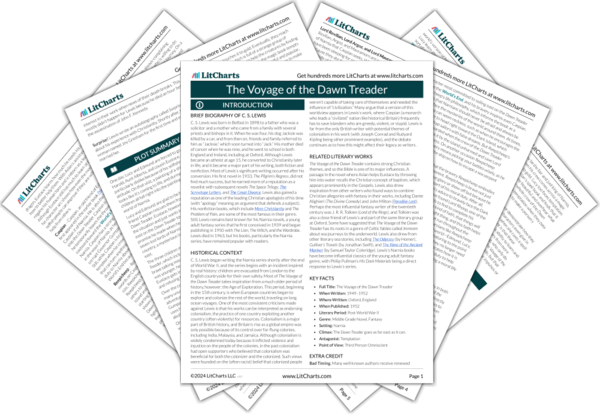C. S. Lewis often wrote about Christianity in both his fiction and nonfiction, and The Voyage of the Dawn Treader is no exception. Rather than directly referencing God or Jesus, the novel instead uses allegories to explore religious ideas. In the world of Narnia, the talking lion Aslan is a Jesus-like figure who dies and comes back to life in The Lion, The Witch, and The Wardrobe (the first book published in the series). In The Voyage of the Dawn Treader, Aslan continues to play a Jesus-like role in the story. One of the most striking scenes is when Eustace has to transform from a dragon back into a human. In a dreamlike state, Aslan leads Eustace to a well in a garden and helps Eustace strip off his old, scaly dragon skin until Eustace is “reborn” as a human. This passage has clear parallels to the Christian concept of baptism, a religious ceremony where water symbolizes a person’s spiritual cleansing, repentance, and rebirth.
Furthermore, the mysterious country of Aslan that the characters reference throughout the story seems to be this world’s version of heaven. The few things that Edmund and Lucy learn about Aslan’s country make it clear that it is some sort of paradise, but to reach it, you have to cross over the World’s End, in a process that seems similar to death. At the end of the novel, Aslan tells Edmund and Lucy that they’ll never see Narnia again but they will see him again, entering his country through their own world instead of Narnia. This further establishes that Aslan is like Christ and that his country is like heaven, even within the “real world” of the novel. In The Voyage of the Dawn Treader, C. S. Lewis uses allegorical elements like the talking lion Aslan and his strange country in order to suggest that the Christian journey can be challenging and even dangerous, but ultimately transformative for those who persevere.
Christianity ThemeTracker

Christianity Quotes in The Voyage of the Dawn Treader
Where sky and water meet,
Where the waves grow sweet,
Doubt not, Reepicheep,
To find all you seek,
There is the utter East.
“You needn’t be afraid of me, boy,” he said. “I’ll treat you well. I bought you for your face. You reminded me of someone.”
“May I ask of whom, my Lord?” said Caspian.
“You remind me of my master, King Caspian of Narnia.”
“Well, anyway, I looked up and saw the very last thing I expected: a huge lion coming slowly toward me. And one queer thing was that there was no moon last night, but there was moonlight where the lion was. So it came nearer and nearer. I was terribly afraid of it. You may think that, being a dragon, I could have knocked any lion out easily enough. But it wasn’t that kind of fear. I wasn’t afraid of it eating me, I was just afraid of it—if you can understand.”
“I will say the spell,” said Lucy. “I don’t care. I will.” She said I don’t care because she had a strong feeling that she mustn’t.
But when she looked back at the opening words of the spell, there in the middle of the writing, where she felt quite sure there had been no picture before, she found the great face of a lion, of The Lion, Aslan himself, staring into hers.
“Oh, Aslan,” said she, “it was kind of you to come.”
“I have been here all the time,” said he, “but you have just made me visible.”
“You can’t know,” said the girl. “You can only believe—or not.”
The King took the bucket in both hands, raised it to his lips, sipped, then drank deeply and raised his head. His face was changed. Not only his eyes but everything about him seemed to be brighter.
“Yes,” he said, “it is sweet. That’s real water, that. I’m not sure that it isn’t going to kill me. But it is the death I would have chosen—if I’d known about it till now.”
“What do you mean?” asked Edmund.
“It—it’s like light more than anything else,” said Caspian.
“That is what it is,” said Reepicheep. “Drinkable light. We must be very near the end of the world now.”
“Dearest,” said Aslan very gently, “you and your brother will never come back to Narnia.”
“Oh, Aslan!!” said Edmund and Lucy both together in despairing voices.
“You are too old, children,” said Aslan, “and you must begin to come close to your own world now.”
“Only two more things need to be told. One is that Caspian and his men all came safely back to Ramandu’s Island. And the three lords woke from their sleep. Caspian married Ramandu’s daughter and they all reached Narnia in the end, and she became a great queen and the mother and grandmother of great kings. The other is that back in our own world everyone soon started saying how Eustace had improved, and how “You’d never know him for the same boy”: everyone except Aunt Alberta, who said he had become very commonplace and tiresome and it must have been the influence of those Pevensie children.











